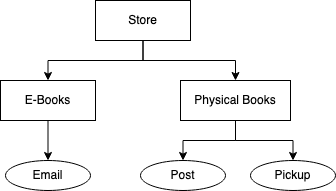Single Table Inheritance in Rails
Many a times we come across situations where we have slight variations in the logic for different use cases of essentially the same model.
For example, lets say we are building an online book store. This store sells both e-books and physical books, and supports multiple shipping methods.

The supported shipping methods for e-books are Email and for physical books are
Pickup and Post. We could model this using just 2 tables, Item and ShippingMethod
with a lot of if ... else ... statements
class Book
def supported_shipping_methods
if ebook?
[:email]
else
[:post, :pickup]
end
end
end
class ShippingMethod
def process
case type
when :email
send_email
when :post
send_post
when :pickup
send_for_pickup
end
end
end
As you can guess, this quickly devolves into a mess. One powerful technique we can use to organize such code is Single Table Inheritance, or STI for short.
Rails makes it really simple to implement STI. For the above example, we’ll have a table
named books with a column named type
create_table :books do |t|
t.string :name
t.integer :price
t.string :type, null: false
t.timestamps
end
And for our models, we will have
class Book < ActiveRecord::Base
# All the common functionality can go here
end
class EBook < Book
# Only methods that are specific to the type of book go here
def supported_shipping_methods
[:email]
end
end
class PhysicalBook < Book
def supported_shipping_methods
[:post, :pickup]
end
end
Now when I do any query on EBook or PhysicalBook, ActiveRecord automatically appends
the type query for me. For example, when doing EBook.create(attrs), we do not need
to add the type attribute. Similarly, we can query different models,
Book.all # Lists all books
EBook.all # Lists all books with type: EBook
PhysicalBook.all # Lists all books with type: PhysicalBook
We can even create associations with the specific sub classes.
class Store < ActiveRecord::Base
has_many :books
has_many :e_books
has_many :physical_books
end
and Rails will handle adding the type to the query itself !!
P.S. Rails 6 introduced an interesting new concept called Delegated Types. While it solves a different use case than STI, do give it a look before deciding on implementing STI in your apps.